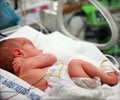The risk of autism doubled or tripled in extremely prematured infants, who are born more than three months earlier than the normal due date.
Babies born more than three months early appear to be at double or triple the risk of autism, say US researchers.
According to scientists from Boston University School of Medicine (BUSM) and Boston Medical Center (BMC), in collaboration with other medical centers, children born more than three months premature, are at three times the risk for screening positive on the modified checklist for autism in toddlers (M-CHAT).Children who screen positive on M-CHAT may be at greater risk for developing autism.
The study has been published in the January issue of Journal of Pediatrics.
The Council on Children with Disabilities of the American Academy of Pediatrics recommends that pediatricians screen for an autism spectrum disorder (ASD) if there are concerns about the child's development.
One of the ASD-specific screening tools is the M-CHAT. The M-CHAT is a checklist that asks the parent/caregiver to report on 23 behaviors.
Checking any three items or two of six critical items as "unable to perform" leads to a positive screen on M-CHAT.
Advertisement
According to the researchers, when an M-CHAT is used as a screen in unselected children during well-child care visits between 16 and 30 months of age, 5.7 percent screen positive.
Advertisement
"However, in our study, even after excluding those children with motor, vision and hearing impairments, we still found 16 percent screened positive," said lead author Karl Kuban, MD, SMEpi, a professor of pediatrics and neurology at BUSM and Chief, Division of Pediatric Neurology at BMC.
"Because we have not yet determined if those who screened positive satisfy criteria for an ASD, we cannot yet assess the predictive values of the M-CHAT among children born at extremely low gestational ages," he added.
Making a diagnosis of ASD often occurs after many years of symptoms, at times delaying appropriate services for children with the disorder.
"Determining the predictive value for screening positive on the M-CHAT among extremely low gestational age children and among handicapped children may offer critical information for pediatricians, since the AAP has recommended early screening for autism," added Kuban.
Source-ANI
PRI/SK











